Cat drooling is when an excess of saliva drips or pours from a cat’s mouth. Drooling is a natural, normal process in many cats; however, excessive drooling can indicate an underlying health issue requiring veterinary attention.
Excessive drooling (ptyalism) can be caused by various things, including an upset stomach, ingesting something poisonous, heatstroke, dental problems, or simply because your cat is excited to see you.
In contrast, foaming is when the cat produces frothy foam from her mouth, making her look like she’s cleaning her teeth with too much toothpaste. When a cat spits, she takes a sharp intake of breath and exhales quickly and violently, usually as a sign of aggression or extreme anxiety. When a cat vomits, she throws up. Cats usually throw up twice if they’ve eaten something toxic or simply overeat.
You can often prevent your cat from drooling by having her examined by a vet and cleared of any underlying health conditions that might be causing the problem. Regular dental care is also essential to prevent conditions such as gingivitis and periodontal disease from affecting your pet. Cats are notorious for not drinking enough water, so ensure your cat is well-hydrated, especially during hot weather. Sometimes, offering your cat dental chews can help to prevent her from drooling.
If your cat drools excessively, you want to find out why. Keep reading to learn more about the causes of cat drooling and what you can do to prevent it.
Why Is My Cat Drooling?
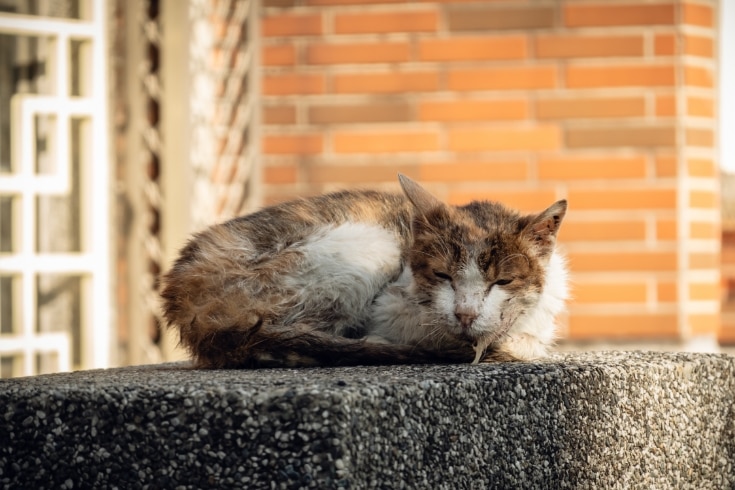
Cat drooling can be a messy and somewhat alarming business for cat owners. So, what causes a cat to drool, and is drooling a normal behavior in cats?
Keep reading to learn more about why your cat drools sometimes.
Excitement Or Contentment
Cats often drool when relaxed, content, or excited, a behavior that can be traced back to kittenhood. As kittens, cats knead their paws on their mothers to stimulate milk release, resulting in a meal and building the bond between mom and baby.
As adults, feelings of contentment typically lead to your cat kneading your lap, which stimulates drooling because of the connection to nursing. So, if your cat starts drooling when you’re petting her, don’t be surprised; that probably simply means your cat loves you.
Nausea Or Upset Stomach
A cat with an upset stomach or vomits often drools a lot. In that case, we advise you to seek veterinary advice to work out what’s causing the upset stomach, as a serious underlying health issue could be to blame.
Your vet might recommend lab tests to look more closely at your cat’s blood cell count, urine content, and organ function. The results of those tests can help determine the best next steps for treatment.
Dental Issues
Oral and dental issues in cats can often go undetected until they cause severe pain, often accompanied by excessive drooling. Drooling can also be caused by gum disease (gingivitis), tooth damage, mouth ulcers, infections, and resorptive lesions.
Once the problem is identified, your vet can clean your cat’s teeth, remove any broken or rotten ones, and prescribe antibiotics to deal with any infections.
Foreign Object
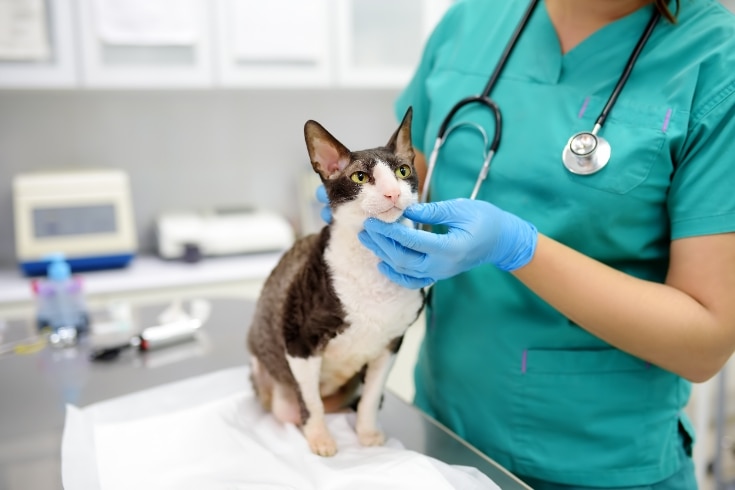
If your cat gets a foreign object stuck in her mouth, she will probably drool. Common oral foreign bodies include string, grass, and small toy parts.
Don’t try to remove any string you see hanging out of your cat’s mouth, as the thread could be tangled around something in the animal’s stomach or intestines, and you could cause major damage by tugging on it. Instead, get your pet to the closest vet clinic as an emergency.
Toxic Substances
If your cat has chewed or licked something toxic, drooling and excessive salivation are common. Toxins commonly ingested by cats include poisonous plants, toxic foods, and caustic chemicals, but pesticides and flea or tick medication not meant for cats can cause drooling, too.
If you think your cat has eaten something toxic, don’t wait! Take your pet to the vet clinic immediately.
Respiratory Infections
Upper respiratory tract infections, such as sinus, nose, or throat infections, can also make your cat drool. Your cat is more likely to contract an upper respiratory infection if she is often around other cats, was recently adopted from a shelter, or stayed in a boarding facility.
As with any health issue, you should immediately take your cat to the vet clinic for a definitive diagnosis and treatment plan.
Heatstroke Or Overheating
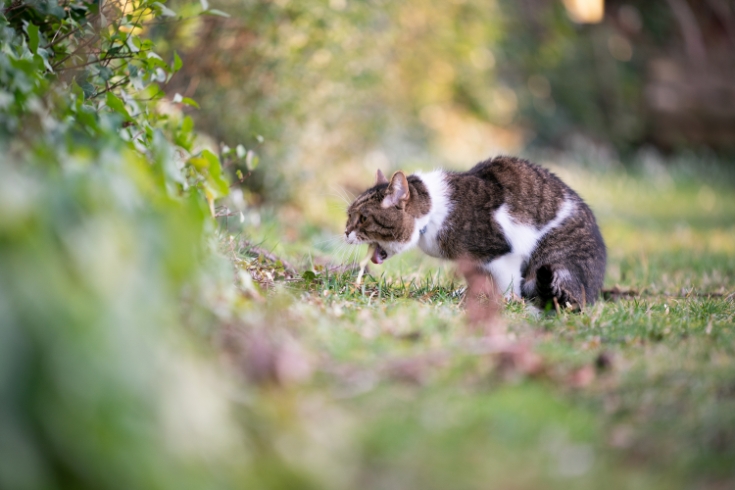
Heatstroke is a potentially life-threatening condition where the cat’s body temperature increases to such a point that organ failure and even death can occur.
The weather doesn’t need to be hot for your cat to develop heat stroke. Exercising excessively in warm, humid weather or being left in a poorly ventilated environment will also cause your cat to overheat.
Cats overheat very easily because they can’t remove layers when they get too hot like we can, and they can’t always move to cooler places to get out of the sun. Did you know that cats cannot sweat like humans do, making them less able to regulate their body temperature?
Common early signs of heatstroke in cats include panting, vomiting, agitation, and excessive drooling.
Oral Injuries
Oral injuries and trauma can cause a cat to drool excessively. When I worked at a veterinary clinic some years ago, a stray cat was rushed in as an emergency, having been hit by a car. the cat had fairly minor injuries, including a fractured jaw, which the vets were able to repair.
I remember when Royston, as he was christened, arrived at the clinic. He was drooling excessively because of the trauma to his mouth. However, once the injury began to heal, the drooling quickly stopped.
Nervousness Or Anxiety
Anxiety or nervousness can sometimes cause a cat to drool during vet visits, on a road trip, or when fireworks are being set off. If your cat’s drooling and anxiety are short-lived, there’s nothing to worry about, but if your cat gets upset regularly, you should talk to your vet.
Neurological Issues
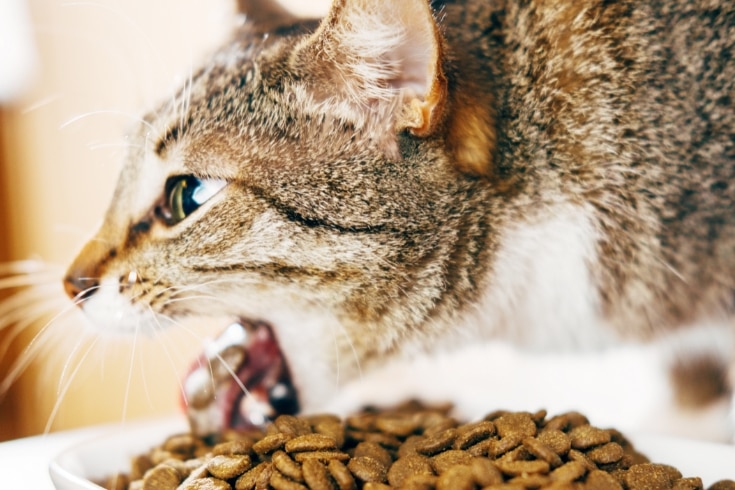
A cat suffering from a neurological disease might drool if she can’t chew or swallow food. You would also see other signs of neurological disease, including problems picking up food, inability to move her tongue, balance issues, and general body weakness.
Many diseases can present with neurological symptoms. For example, if the cat’s cranial nerves are affected, you will see localized issues only affecting her face, but if the health condition compasses the whole body, you could see signs in many different body areas.
When Should I Be Concerned About My Cat’s Excessive Drooling?
Cat excessive drooling is a cause for concern in any case where your cat is not happy and content.
As mentioned earlier, cats sometimes drool when relaxed, purring and kneading on your lap. However, if your cat is drooling excessively for no obvious reason, we recommend contacting your vet for advice, as the drooling could be caused by a health issue affecting your kitty.
What Is The Difference Between A Cat Drooling, Spitting, Foaming, And Vomiting?
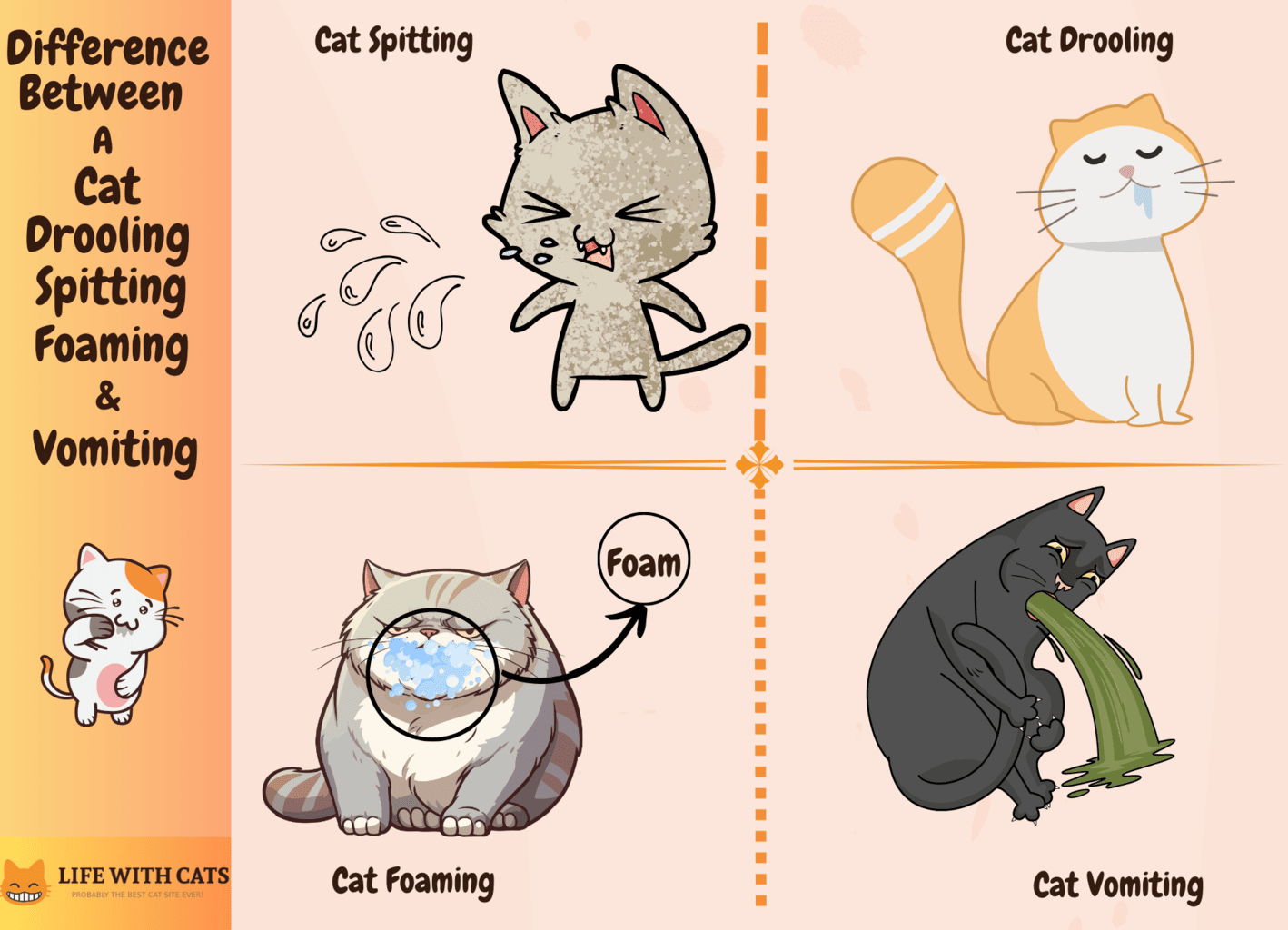
The difference between a cat drooling, spitting, foaming, and vomiting is actually pretty obvious, but we describe these various symptoms for you below.
Cat Spitting
When a cat spits, it’s almost always a sign of agitation or aggression. The cat usually makes a hissing or spitting sound and may show other signs of discomfort, such as arching her back, flattening her ears, and baring her teeth.
Spitting is often a warning sign that a cat is feeling threatened or defensive, and it’s best to give her space until she calms down.
Cat Drooling
A cat drooling is when saliva flows excessively from a cat’s mouth, often wetting the fur around her mouth. That can happen when a cat is relaxed and content, such as when they’re sitting on your lap being petted, or it can be a sign of an underlying health issue if it occurs excessively and for no obvious reason.
It’s important to monitor your cat’s drooling behavior and contact your vet if you notice anything unusual or concerning.
Cat Foaming
When a cat is foaming at the mouth, it’s because the cat’s mouth is producing excessive amounts of saliva. That makes the cat appear to be frothing at the mouth, and the foam may be mixed with saliva and other fluids.
Foaming at the mouth can be a sign of several different health issues, such as poisoning, rabies, or other infections. Still, if you discover your cat foaming, it’s essential to contact your vet as soon as possible.
Cat Vomiting
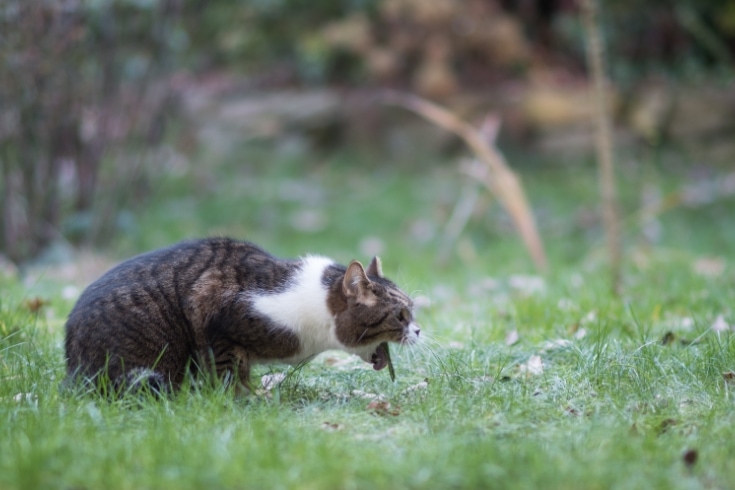
When a cat vomits, she forcefully expels the contents of her stomach out through her mouth. The vomit can contain food, hairballs, or other substances, and it may have a frothy or liquid consistency accompanied by a foul smell.
Cat vomiting can be caused by various factors, including gobbling up a meal too quickly, overeating, ingesting something toxic, or having an underlying medical condition. If your cat is vomiting frequently or appears distressed, seeking immediate veterinary advice is crucial.
Can You Stop A Cat From Drooling?
No, you can’t completely stop a cat from drooling since it is a natural biological process. After all, if your cat is happy and content and only drools to show you that she loves you, why would you want her to hide that?
However, suppose your pet’s drooling is caused by something else. In that case, you can manage and prevent the habit by addressing any underlying medical problems, providing regular dental care, and keeping toxic substances well out of your pet’s reach.
Here are some effective ways of preventing your cat from drooling.
Regular Dental Care
Oral problems commonly cause drooling in cats, especially broken or loose teeth and gum disease. You can prevent a minor issue from becoming a serious problem by ensuring your cat receives regular dental care and checkups from your vet.
Monitor Their Diet
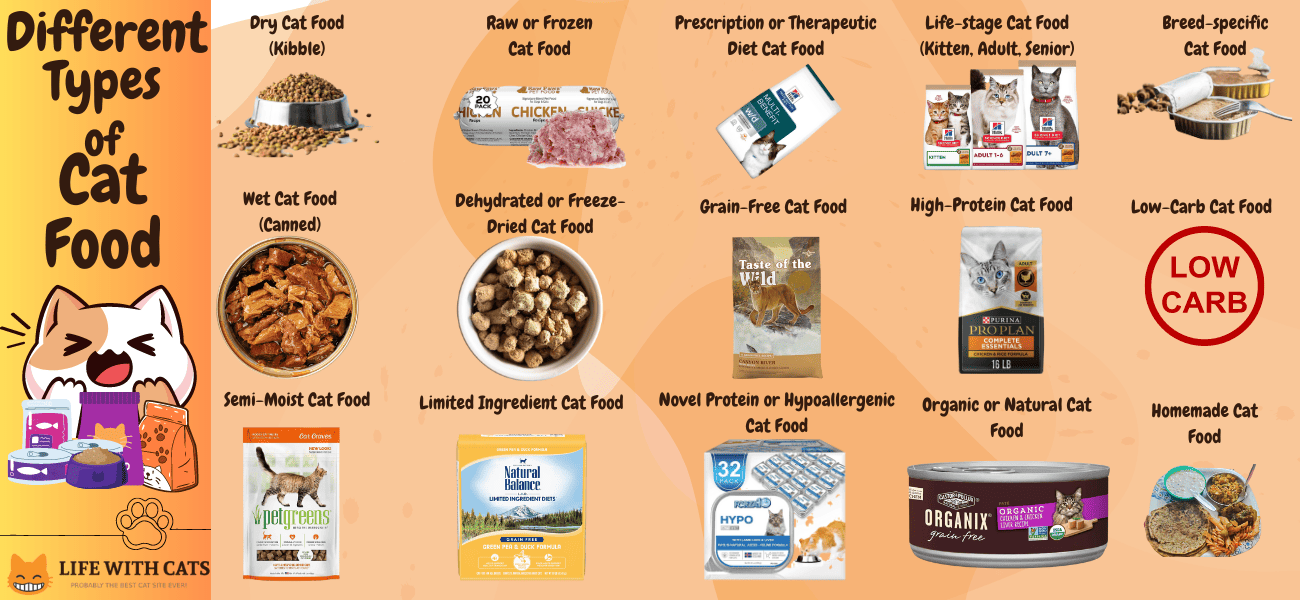
Some foods might cause allergies or intolerances in cats. If you suspect a particular food is causing your furry friend’s excessive drooling, try eliminating it and monitor the cat’s reaction. Ask your vet clinic staff for advice on feeding your cat if she has a sensitive tummy to prevent the drooling problem from recurring.
Address Stress And Anxiety
Cats sometimes drool when they are anxious or stressed, and by providing your pet with a safe environment, toys, and attention, you can alleviate these feelings and reduce her drooling. You might also want to try using calming pheromone sprays or plugins around your home or in your cat’s carrier if traveling triggers stress-related drooling.
Check For Foreign Objects
If your cat has a foreign object stuck in her teeth or throat, that could stimulate excessive salivation and drooling. However, as mentioned above, we don’t recommend trying to pull something from your cat’s mouth in case she has swallowed it and it’s tangled around her intestines.
In cases where your cat has a foreign object, such as string or thread, trailing from her mouth, always contact your vet for emergency advice.
Visit The Veterinarian
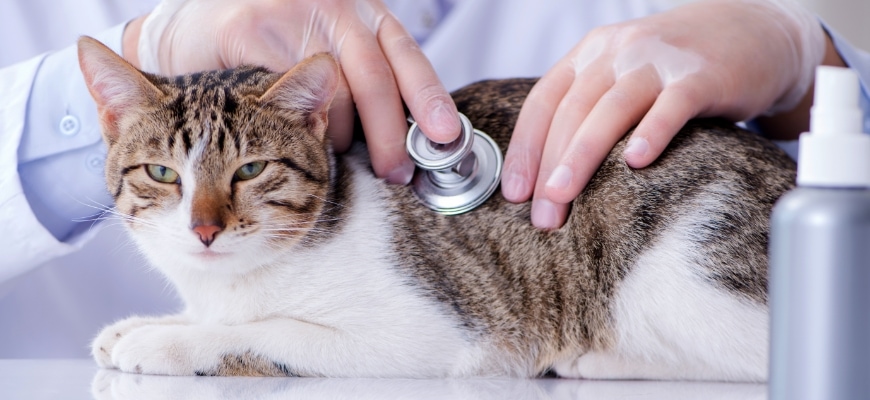
Excessive drooling can often be a sign of some undiagnosed underlying health condition or dental problems, so you should always refer your cat to your vet if she is drooling for no obvious reason.
Check For Oral Injuries
Check your cat’s mouth to make sure she has not sustained any form of injury or trauma, especially if your pet spends much of her time outside and could have gotten into a fight with another cat or been clipped by a car.
Treat Dental Issues
Take your cat for regular dental checkups with your vet so that any dental issues can be treated before becoming serious.
Hydration
Cats are notoriously bad at drinking water, and drooling can result from dehydration. Make sure your cat has plenty of fresh, clean water to drink, and consider feeding her wet food as some of her diet.
Avoid Toxic Substances
Toxins can be contained in plants, chemicals, and human foods, so be sure to keep any toxic substances well out of reach of your cat, and contact your vet immediately if you think your pet has ingested any form of poison.
Manage Nausea
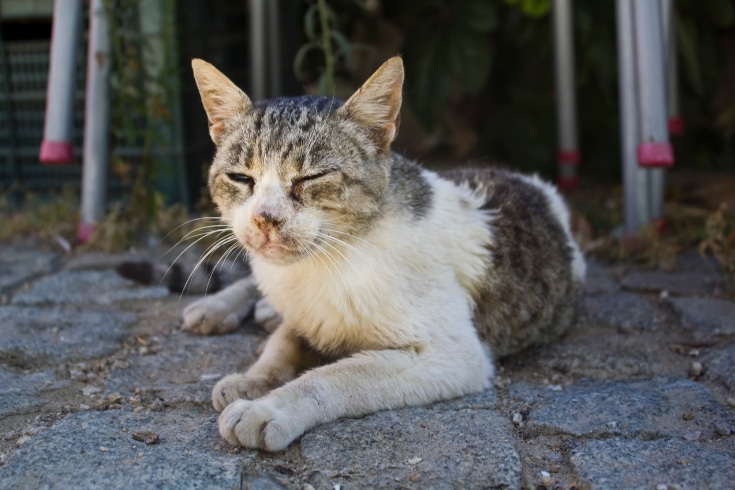
If your cat feels nauseous, perhaps after a car ride or if she has eaten something unusual, she might start drooling. Have a chat with your vet if you’re concerned that your cat might be feeling queasy, and take steps to reduce her nausea and stop her from drooling.
Medication And Medical Conditions
Some drugs can cause excessive drooling as a side effect, so if your cat starts drooling after beginning a new medication, check the side effects listed on the product and consult with your vet.
Similarly, medical conditions, such as upper respiratory tract infections, can cause drooling, and fixing them can reduce saliva production. Again, ask your vet for advice if you think you can’t see an obvious cause for your cat’s drooling, as she could be hiding an underlying health condition.
Prevent Overheating
Drooling can be a sign of heatstroke, so take any necessary steps to be sure your cat doesn’t overheat, especially on warm, humid days. If your cat has access to the outside, check that she has plenty of fresh, clean water and lots of shade where she can get out of the sun. If it’s very warm in your house, you might want to consider using a fan or air conditioning to keep your cat cool.
Provide Dental Chews
Dental chews can help scrape off plaque from your cat’s teeth, promoting better oral health and potentially reducing drooling caused by dental issues. Your vet can advise you on what chews are best for your cat and check that all’s well with her teeth.
Cat Drooling FAQs
In this part of our guide, we answer some of the most frequently asked questions about the causes of cat drooling.
What Should I Do If I Notice My Cat Drooling More Than Usual?
If you notice your cat drooling more than usual, we strongly advise seeking veterinary advice since it’s likely your cat has an underlying health condition and drooling is one of its symptoms.
Are Certain Cat Breeds More Prone To Drooling?
Yes, some cat breeds can be more prone to drooling than others, especially very affectionate cats that like to sit on your lap and knead. Siamese and Bengal are two breeds of cats known as droolers, especially as kittens.
Should I Be Concerned If My Senior Cat Starts Drooling?
Yes, if your senior cat suddenly starts drooling and she hasn’t done so before, you should be concerned.
Many health conditions could cause a senior cat to drool, but in my experience, dental or oral problems are often the culprit. If your elderly cat begins drooling, you should always ask your vet for advice and have your old girl checked over to be safe.
Can Motion Sickness Lead To Drooling In Cats During Car Rides?
If you get car sick, you’ll know how horrendous that makes you feel. Cats can also get that unpleasant, queasy feeling when traveling by car and even by air or boat, and excessive drooling is one of the main symptoms of motion sickness in felines.
Fortunately, treating motion sickness in cats is pretty simple. You might need to get your cat more familiar with riding in your car, and if that doesn’t work, various medications are available.
Some antihistamines have a mild sedative effect to calm your cat during the journey and reduce her drooling. You can also use over-the-counter medications like dimenhydrinate and meclizine, which reduce nausea and drooling without having a sedative effect.
Why Does My Cat Drool When Kneading Soft Surfaces?
Kittens knead their mother to stimulate milk production, and adult cats often do the same to their owners’ laps and on other soft surfaces. Experts think it that adult cat kneading is a way of showing affection, and the drooling that often accompanies the behavior is in anticipation of a meal.
When Is It Necessary To Seek Veterinary Care For My Drooling Cat?
You should seek immediate veterinary care if there’s no obvious cause for the drooling, such as showing her owner affection or travel sickness. The most likely cause of the drooling is some undiagnosed health issue that requires your vet’s urgent intervention.
Conclusion
Cats sometimes drool to show affection when kneading their owner’s lap as kittens do, probably in anticipation of a nice meal.
However, drooling is also caused by health problems and dental issues that require immediate veterinary advice and intervention. Sometimes, drooling can be caused by a foreign object stuck in the cat’s mouth, an upper respiratory tract infection, dehydration, and overheating on hot days.
For that reason, you should always seek veterinary advice if you notice your cat drooling excessively for no obvious reason.